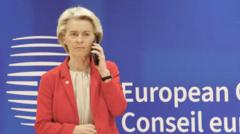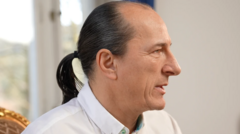This landmark deal, spearheaded by European Commission President Ursula von der Leyen, seeks to revive and expand trade relationships with Argentina, Brazil, Paraguay, and Uruguay, following setbacks from a previous agreement. By lowering tariffs and streamlining customs, European businesses hope to gain access to vital raw materials, notably lithium and nickel, crucial for electric vehicle production. As the trade deal moves forward, concerns regarding environmental standards, competitiveness, and the position of European farmers remain points of contention among EU member states.
EU Enhances Trade Relations with South America Amid Environmental Concerns

EU Enhances Trade Relations with South America Amid Environmental Concerns
The European Union has announced a trade agreement with key South American nations, aiming to bolster economic ties and simplify trade processes.
The European Union has taken a significant step towards strengthening its trade relations with South America by signing a comprehensive trade agreement with four major economies in the region. President of the European Commission, Ursula von der Leyen, marked this moment as a "truly historic milestone" in a world increasingly characterized by economic confrontations. The newly forged deal focuses on improving trade dynamics between Europe and South America's largest economies: Argentina, Brazil, Paraguay, and Uruguay.
The previous attempt to establish a trade deal in 2019 floundered as it failed to receive backing from all EU nations. However, with the new agreement, it is hoped that member states will approve it, leading to decreased tariffs and simplified customs procedures between both regions. This will facilitate EU companies' access to South American raw materials, essential for various industries.
"In the interest of Europe's citizens, this deal implies job growth, better prices, and more options," Ms. von der Leyen affirmed during a press conference in Montevideo. Last year, Europe exported nearly $59 billion in goods to the four nations, while imports totaled almost $57 billion, predominantly comprising of critical minerals like lithium and nickel, as well as meat and agricultural produce.
The potential for increased exports, especially in sectors such as automobiles and pharmaceuticals, comes at a time when trade tensions are escalating, notably with economic powerhouses like the US and China. With both regions covering around 700 million consumers and contributing to 20% of global economic output, leaders are optimistic about mutual economic growth resulting from this agreement.
However, previous concerns regarding environmental practices and sustainable farming, which led to the collapse of the earlier agreement, have not entirely been resolved. The change in leadership in Brazil and Argentina has led to progress in addressing these issues. Uruguay's president, Luis Lacalle Pou, underscored the significance of this deal for smaller Mercosur economies, emphasizing the need for global trade opportunities.
Despite this optimism, challenges regarding ratification persist, particularly from nations like France, Italy, and Poland, whose farmers feel threatened by unfair competition with lower compliance costs in South America. French Trade Minister Sophie Primas recently stated that the document signed in Montevideo is merely a political conclusion and does not yet bind member states.
Germany's spokesperson hailed the deal as a unique opportunity that should not be overlooked and signaled ongoing efforts to bridge the gaps created by French reservations. As EU member states navigate these complex discussions, the focus remains on ensuring that this deal effectively promotes international trade without compromising environmental standards.




















